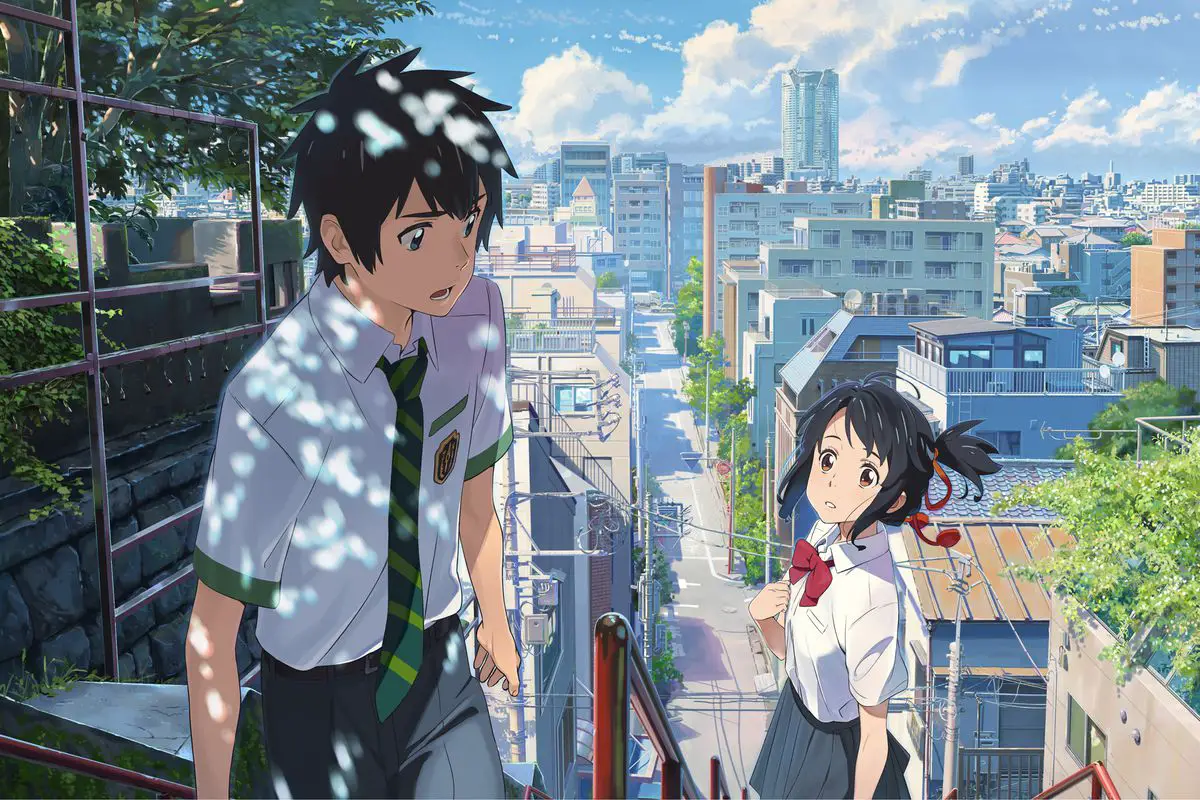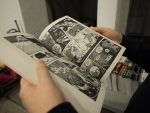In 2016, the Japanese production “Kimi no na wa” changed anime movies forever. Its director and writer, Makoto Shinkai, has since been heralded as the next Hayao Miyazaki — the renowned director behind movies such as “Spirited Away,” “My Neighbor Totoro” and “Howl’s Moving Castle” — and is in the post-production process for his upcoming movie, “Weathering With You.” Even so, Shinkai’s success pales in comparison to the accolades of “Kimi no na wa,” which has become the highest-grossing anime movie Japan has ever seen.
Never heard of it? Don’t fret; most English-speaking viewers recognize it as another title, “Your Name,” and if you’ve never seen the film before, I highly recommend watching it. “Your Name” features an intricate plot with a startling twist, so consider this an obligatory spoiler warning.
“Your Name” tells the story of two teenage strangers, Mitsuha Miyamizu and Taki Tachibana, who come from vastly different home environments. Supernatural forces intervene in their lives, making them intermittently wake up in each other’s bodies. The two combat their bewilderedness and slowly begin to know each other beyond the normal bounds of intimacy. When the phenomenon suddenly stops, Tachibana embarks on a quest to finally meet Miyamizu; instead, he makes a frightening discovery.
The incredibly creative story is great for a bevy of reasons, but chief among them are its visuals. Entirely composed of hand-drawn frames, “Your Name” is a beautiful work that combines life-like vitality with a traditional anime style. As a result, its staging, setting, apparel and other features quite frequently leave the viewer in a state of awe.
As much of a triumph the visuals are, the pacing of “Your Name” deserves just as much credit. The movie is a whirlwind of emotional gravitas, melancholy sadness, humor and hope. Those unaccustomed to watching a Japanese film with English subtitles — there is an English-language version, but I don’t recommend it — might find the plot slow in its build up, which is certainly fair for the first watch.
However, watching the film a second or third time reveals a flood of information that initially eludes cinephiles. The narrative is a tightly bound cord that ravels and unravels with a mysterious rhythm — if you’ve seen the movie, you’ll know what I mean.
Moreover, the voice acting is marvelous. Ryunosuke Kamiki (Tachibana) and Mone Kamishiraishi (Miyamizu) capture the emotional and bewildering feel of the film in every line of dialogue, a considerable feat considering they each spend a large portion of the movie as each other.
Perhaps the most enjoyable aspect of the film is its many layers, like a finely crafted baklava. But all jesting aside, “Your Name” is so multidimensional that fans have scrutinized every single one of its 118 minutes of runtime.
Theories have circulated about everything from the way Miyamizu writes her name to why the film included “kataware-doki,” a Hida word for “twilight,” which literally translates to “fragment of time.” Although something as simple as writing a name sounds trivial, one of the most important and devastating scenes in “Your Name” correlates to the direction of the first stroke of her name.
In addition to providing fodder for fan theories,”Your Name” effectively incorporates Japanese culture and mythology. Some of the major plot points rely on Miyamizu’s “kuchikamizake,” which is a rice-based alcohol traditionally made by virgins, and braided chord called “kumihimo,” alluding to the mythology of the red string of fate that connects people meant to be together.
The soundtrack, composed by the Japanese rock band RADWIMPS, masterfully captures the animation’s tone and transcends language barriers, powerfully conveying the fleeting sense of nostalgia so prevalent in “Your Name.” While only four songs contain lyrics, all carry the same reflective sentiment, exemplified by “Nandemoniya,” the closing song of the film. In RADWIMPS’ English translation, the opening stanza reads,
“The sorrowful gust of wind that blew right between you and me / Where did it find the loneliness it carried on the breeze? / Looking up at the sky after shedding a stream of tears / I could see for miles of blue, it’s never been so clear.”
Shinkai’s “Your Name” is not likely to be forgotten by fans or critics in the near future, as it has garnered a 97 percent freshness rating on Rotten Tomatoes and a favorable 8.4 out of 10 on IMDb. In addition, the movie has received a heap of awards and nominations, including the best animation award from the Los Angeles Film Critics Association.
“Your Name” is also in the process of a live-action adaptation. Hollywood detonation connoisseur Michael Bay is producing the film, and Marc Webb, director of “The Amazing Spider-Man” and “500 Days of Summer,” is serving as its director. The live-action adaptation will be far more Americanized, telling the story of a Chicago boy and a Native-American girl.
Fans have regarded the adaptation’s departure from its Japanese origins with hesitation and criticism, but Shinkai has since voiced support for Webb. The creator is even rumored to have included a small tribute to “500 Days of Summer” in his upcoming anime film “Tenki no Ko,” translated as “Weathering With You.” How Bay and Webb approach the movie is still up to speculation because, as of yet, there isn’t even a release date.
Whether the live-action adaptation thrives or fails ultimately should not impact the outstanding legacy of Shinkai’s work. “Your Name” is a stunningly personal movie that overpowers logic with whispers of beauty. Although there may not be a kiss in the film, no movie, live action or animated, has ever tugged at my heart quite like this, which, at the end of the day, is the most flattering superlative I can ascribe to a film.
















